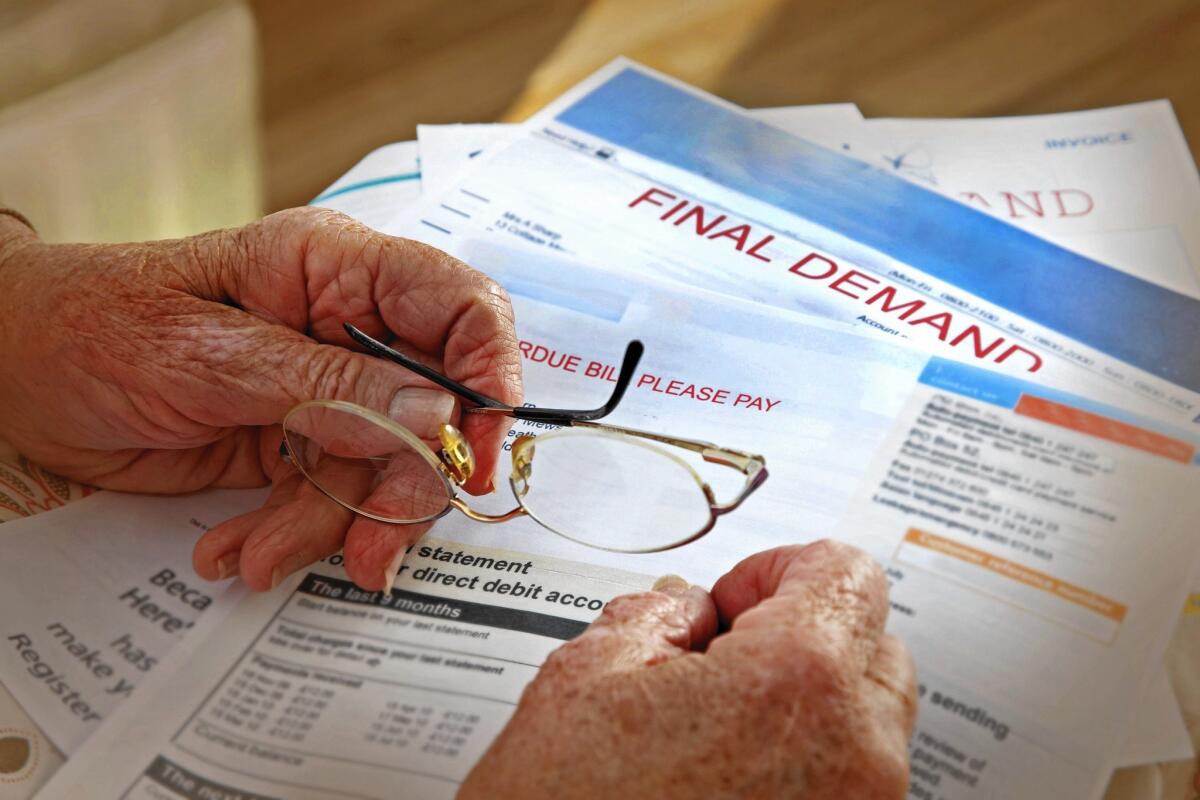Column: A new California law is kicking in that will help keep debt collectors at bay

- Share via
If you owe money, and especially if you’ve got debt collectors breathing down your neck, here’s some good news.
A new California law takes effect Tuesday that prevents debt collectors from emptying your bank account.
When SB 616 was approved last year, the intent was to protect low-income families from being wiped out by too-aggressive collectors.
Now that we’re in the midst of a deadly pandemic, with households across the economic spectrum feeling a financial pinch or experiencing uncertainty, the law takes on even greater significance.
“These are tough times,” said state Sen. Bob Wieckowski (D-Fremont), the author of the legislation and a bankruptcy lawyer.
“This law is going to help a whole lot of folks who didn’t know they’d need help,” he told me.
Specifically, SB 616 blocks debt collectors from draining every last penny from your bank account — something that until now they could do with impunity.
Collectors now have to stop when your account is down to the last $1,788. That’s the minimum the state Department of Social Services says a family of four needs to get by for a month.
Make no mistake: The law doesn’t let you off the hook from your financial obligations. If you owe money, it still has to be repaid.
What SB 616 does is give people some breathing room if their finances are spinning out of control. It provides a little extra time to try work out more manageable repayment terms with collectors.
And at a time like this, we can all take a modicum of comfort in knowing that, in a worst-case scenario, you can’t be left destitute by a debt collector if you’ve lost your job and find yourself unable to pay off a medical bill, say, or a car repair.
“People used to say this couldn’t happen to them,” Wieckowski said. “Now it can. What a difference a year makes.”
When SB 616 was signed into law by Gov. Gavin Newsom last October, the Western Center on Law & Poverty estimated the average Californian owed $15,100 in non-mortgage debt, including medical, student, auto and credit card obligations.
That amount is now almost certainly higher, said Jessica Bartholow, policy advocate for the Los Angeles-based nonprofit organization, which played an instrumental role in passage of the new law.
“It’s not hard to imagine that a lot of Californians are loading up their credit cards right now, just trying to get by,” she told me. “Once debt gets to a collector, they’ll go after it any way they can.”
Debt collectors have various tools at their disposal to target people’s funds, including garnishing wages, placing a levy on bank accounts and taking a bulldozer to your credit score.
California already has a law preventing collectors from taking more than 25% of people’s paychecks. SB 616 applies a threshold to bank accounts, bringing us in line with more than a dozen other states that have adopted similar protections.
Needless to say, the law was opposed by the California Assn. of Collectors, an industry group. It challenged “the dollar amount of the exemption and the fact that it effectively applies to all of a consumer’s accounts.”
Wieckowski said collectors were more concerned about not being able to siphon off every last cent they could get their hands on, rather than the specifics of the law.
He said more than 100,000 Californians were in danger of having their bank accounts emptied prior to the pandemic.
“That number is definitely higher now,” Wieckowski said.
Consumer advocates warned in June that debt collectors recognized a golden opportunity in going after millions of people who were suddenly much easier to find amid stay-at-home orders.
Christine Hines, legislative director for the National Assn. of Consumer Advocates, predicted at the time that “debt collection will only intensify in the coming months.”
Bartholow at the Western Center on Law & Poverty said this appears to be the case, with the pandemic endangering the financial stability not just of low-income families but, increasingly, middle-class households as well.
“We’ve been seeing huge spikes in applications for food assistance,” she said. “It seems like the worst is yet to come.”
Marisabel Torres, California policy director at the Center for Responsible Lending, said a cascade of misery can follow when debt collectors drain bank accounts.
“Consumers are often left with overdraft fees and account closures, and unfortunately they can be pushed out of the financial mainstream,” she said.
“It is especially critical now, as many people are facing increased financial stress due to the pandemic, that we keep more money for life’s necessities safe in their accounts.”
At the federal level, the Consumer Financial Protection Bureau said it received about 75,200 complaints regarding debt collectors last year, making debt collection “among the most prevalent topics of consumer complaints” handled by the agency.
Yet the bureau said it pursued only five — five! — enforcement actions related to debt collection, “two of which were initiated in years prior to 2019.”
Is it any wonder debt collectors are so aggressive? More than 75,000 complaints resulted in the CFPB opening new cases against just three collectors last year, and continuing prior investigations of two others.
SB 616 won’t solve this lack of interest at the federal level. Perhaps a California version of the CFPB envisioned by Gov. Newsom will help.
But the new law adds to the safety net protecting state residents from financial harm.
Hopefully you’ll never need to put it to the test.
More to Read
Inside the business of entertainment
The Wide Shot brings you news, analysis and insights on everything from streaming wars to production — and what it all means for the future.
You may occasionally receive promotional content from the Los Angeles Times.











